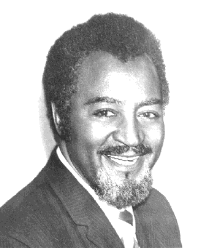|
Find interviews by: | ||
Emmett Wallace Emmett 'Babe' Wallace was born in Brooklyn in 1909. Starting as a singer in a Harlem nightclub he went on to become a very successful musical performer - including a period fronting Ella Fitzgerald's band - as well as an actor on stage and screen, a poet and novelist and a prolific songwriter. Now well into his 90s, Mr Wallace lives in the Actors Fund Retirement Home in New Jersey. My interest in him was sparked by seeing him in the 1939 voodoo picture The Devil's Daughter and discovering that his grandson, musician Jimy Bleu, maintains a website about him. Jimy very kindly agreed to ask his grandfather some questions on my behalf and relay the answers back to me. I am enormously indebted to both Jimy Bleu and Emmett Wallace for this wonderful interview.
“I recall it being very hot! The film was not shot in Haiti... I forgot which island it was actually shot on. Practicing our lines on the boat ride to the island is really the only thing I remember. Ohhh... they gave me more lines in the film at the last minute than I expected or was ready for.” What are your memories of your beautiful co-star, Nina Mae McKinney? “Lovely young lady indeed! ... Quite innocent and she always smelled like a morning walk in a garden.” Was this film made before or after you worked with her in Black Network? “I can't remember... At that time frame, we were involved in a few other projects in film and in theatre simultaneously. We worked together with the highest respect on the sets, but our off-screen relationship was a bit ‘torrid’. I admit I took advantage of her naiveté. She was a genuinely good and honest woman. She definitely didn't deserve the likes of me... Ella too!” [Jimy Bleu notes: “He and I laughed uncontrollably loud at this!] Where would a film like this have been shown and what sort of audiences would have seen it? “From my knowledge, these films were shown in the many theatres, especially in the black neighbourhoods. Back then, in those theatres, you would usually get the main film (Bogart, Cagney etc), then live entertainment (musical group/band, comedy, vaudeville, dancers etc), then cartoon shorts, then the black films. It sure felt good walking down the Brooklyn neighbourhoods and folks coming up to me saying they loved my films. I remember I kept thinking to myself then: ‘Good! Now if only Hollywood would recognise me!’” At that time, the late 1930s, how much integration (if any) was there between the black film industry and mainstream Hollywood? “Very little if I recall correctly. The only parts integration offered to blacks were menial roles (maids, mammies, cooks, butlers, valets etc). Myself, Ralph Cooper and maybe a few others were the ones that adamantly refused to take those roles when we were called for them. We held out for better roles which never came to us from mainstream Hollywood. I understand that today it is a little better, but back then, forget it man! ...This is why Oscar Micheaux and other black companies flourished for a while then. We had no choice but to produce our own product, or at least hook up with the few sympathetic white producers who produced black films. It was not a good time back then for race.” How important was film work to an all-round entertainer like yourself in the 1930s? “I wanted to be the next Cagney, Barrymore etc... Everything I was involved in was supposed to lead me to that final place. I thought the playing field was leveled enough for me to actually have a shot at this goal. With the right film roles, I could reach many folks, thereby displaying my talents. Big screen film was the new thing back then. There is nothing like sitting in a theatre, seeing yourself in a film that the folks in the theatre are diggin' and seeing how they react positively to your performance.” What do you think of the fact that The Devil’s Daughter is being watched and enjoyed by people in their own homes, all over the world, more than 60 years later? “Ahh! ... That's a gas! I just hope folks will recognise the effort of us actors and actresses back then to really get ourselves out there among the Hollywood elite and the many obstacles that were in our way at that time... Wow ... 60 years ago? ... Jeemaneti! ... I must be gettin' old, huh?” NB. Jimy Bleu is currently working on a documentary about Emmett Wallace which includes contributions from Nina Mae McKinney's niece. Official site: newdivinity.com | ||

